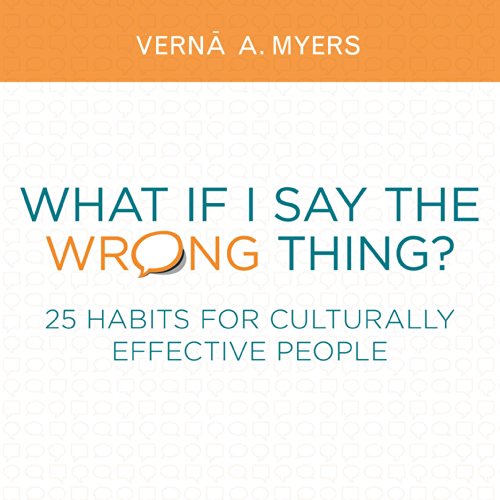What if I Say the Wrong Thing?
Think you might want to read this book?
As schools increasingly become some of the most diverse institutions in the US today, teachers and administrators who seek to be culturally effective need guidance. In What If I Say The Wrong Thing, Verna Myers helps individuals and leaders understand the structures, policies, and cultures that organizations may have in place that hinder achieving equity, diversity, and inclusion. With examples from her personal life and professional career Myers provides readers with useful suggestions for how one can become a more culturally responsible individual and how leaders can transform organizations.
What Would Socrates Ask?
Beyond the individual, how can educators shift the conversation from discriminatory acts to examining the structures that perpetuate them?
How does the culture that we grew up in impact how we interact with or interpret the behaviors of others?
Are there places where we focus too much on the differences between people to the detriment of seeing our commonalities? Where are these places?
What is one thing your school could do to address bias and support a level playing field for everyone?
Concepts
Isms (racism, sexism, homophobia, elitism) and the problems of inequality are not only personal, but structural. Structures are often built into organizations that maintain the status quo and keep change from taking place. Since structures are created by people, people need to be aware of how they can work to change structural inequalities in their organizations.
Bias, prejudice, and the isms are not the same. To be culturally effective, we need to know the differences between them and acknowledge that we may employ them at different times.
Focusing on differences is a reason we don’t see the commonalities we have with our fellow human beings. When we focus on what we have in common, we are more likely to see the differences that others bring to a situation as a positive.
While many of us are interested in others’ cultures, if we are honest, we would admit that we don’t consider them as legitimate or sensible as our own culture. We must accept that other cultures are valid. We can do this by questioning our assumptions and finding those who know more about the other culture that we are encountering.
The Culturally Responsive Individual- a culturally responsive person communicates with those who are different from themselves.
The Culturally Responsive Organization- Culturally responsive organizations are diverse and inclusive.
Quotes from the author
“Systematic oppression of various groups does not need your intentional or unintentional involvement in order to be alive and operational in our institutions. It is already embedded and is self-perpetuating. And it will continue to be until ‘good people’ become culturally effective people and even then will take big changes to dismantle.”
“To be culturally effective when it comes to the “isms” we have to be willing to accept that we are all outside when the fallout happened that in lots of ways we caught the message that our one-up groups are intellectually, culturally, and morally superior to all other one-down groups.”
“A culturally responsive person communicates with those who are different from themselves.”
“Seeing the commonalities begins when we realize that as human beings we share a basic set of desires. Most of us desire to be loved and happy; to be well and free from suffering; to have food, shelter, and clothing; to enjoy the fruits of our labors; to be respected and treated fairly. And not only do we want these things for ourselves, we also want them for our loved ones: our family, our friends, and our close associates.”
“... the effect of micro-inequalities is real - they create irritation, frustration, and anger. When they happen over and over again, they accumulate and develop a weight of their own.”
“Becoming mutually adaptive means that we not only value difference but are able to see ways that our organization and its individuals can change practice and mores to respect and take advantage of difference.”
“... many of us are more interested in replicating ourselves than in growing diversity.”
“So much about getting good at this work has nothing to do with cognitive intelligence. In fact, real progress usually begins when we develop emotional, social, and spiritual intelligence - when we humble ourselves to learn what we don’t know.”
Implement tomorrow?
The easiest way to show inclusion is to work to pronounce someone’s name correctly. Don’t give people whose names you have difficulty pronouncing nicknames. Don’t be embarrassed if you have trouble with name pronunciation. Ask the person how to pronounce their name and practice it. Say, “this is important and I want to get it right.”
Gateways to further learning
The applicability of this book to education is ….
Resources


